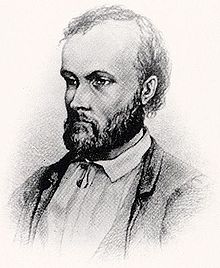Aleksis Kivi

Aleksis Kivi [ ˈɑlɛksis ˈkivi ] , actually Alexis Stenvall (born October 10, 1834 in Nurmijärvi , Finland , † December 31, 1872 in Tuusula ) was a Finnish national poet . He is considered the father of modern literature in the Finnish language . Swedish had previously been the literary language of his home country .
Life
The writer, famous under his famous name Aleksis Kivi (Swedish Stenvall "stone bench", Finnish Kivi "stone"), was born as the youngest of five children. His parents, tailors Eerik Stenvall and Anna-Kristiin, already had three sons and a daughter at this point. He later described himself as a lively, resourceful, “happy and courageous” child and learned not only Finnish but also the Swedish language, which every “educated Finn” mastered at the time. After attending elementary school, he moved to a school in Helsinki in 1846 at the age of twelve .
Kivi lived for a while with a tailor named Albin Palmqvist and used the free time almost exclusively for reading. With the five years older daughter of Palmqvist, Albina, he spoke about the works of Shakespeare , Cervantes and Byron . Alexis fell in love with Albina, however, she went to Denmark in 1853 and began taking morphine . During the following years, Albina spent much time out of the country, but met Kivi several times on her visits to Finland. Both never married. A number of Kivi's female roles (Liisa in Yö ja Päivä (1866), Elma in Kankurit (1866), Lea in Lea (1868)) are said to reflect Albina.
Aleksis Kivi finished his school days with the final examination. He broke off a later university course. In his youth he met the most important personalities of his time such as Johan Vilhelm Snellman , Elias Lönnrot and Fredrik Cygnaeus .
Kivi's creative period lasted almost ten years. The devastating criticism of his later world-famous novel The Seven Brothers robbed him of all courage to live. It was called u. a. 1870: "It is a ridiculous job and an eyesore on Finnish literature". He spent the last months of his life in an inconspicuous, dark house in Syvälahti , which reflects his lifelong nightmare “homelessness and poverty”. The house at Tuusulanjärvi belonged to his brother Albert Stenvall. He suffered from depression, attacks of pain and distress and died on the last day of 1872 at the age of 38. His famous last words were: Lever, lever (Swedish: "I live").
Opera
Einojuhani Rautavaara wrote the opera Aleksis Kivi, a portrait of the Finnish national poet, which premiered as the main attraction of the 1997 Opera Festival in Savonlinna , Finland .
Honors
In 1999 the asteroid (4181) Kivi was named after him.
Works
- Kullervo , 1864, used by the Finnish composer Aulis Sallinen alongside the Kalevala as the basis for his opera of the same name from 1992
- Nummisuutarit , 1864 (German Die Heideschuster , translation: Gustav Schmidt, 1922)
- Olviretki Schleusingenissa , 1866 (German beer trip to Schleusingen )
- Yö ja päivä , play, 1866 (German night and day )
- Lea , play, 1868
- Seitsemän veljestä , 1870 (German: The Seven Brothers , several translations, such as 1942 by Rita Öhquist )
- Margareta , play, 1871
literature
- Friedrich Ege: Children of the Finnish Oedemark. 2 essays in the sociology of literature. Karlsruher Bote, Karlsruhe 1972.
- Manfred Peter Hein : The canonization of a novel. Alexis Kivis "Seven Brothers" 1870–1980. Otava, Helsinki 1984. (= Trajekt; 4), ISBN 3-608-95344-2 .
- Manfred Peter Hein: Finnish literature in Germany. Essays on the Kivi and Sillanpää reception. German Dept. d. Univ. Vaasa, Vaasa 1991. (= Saxa; 5), ISBN 951-95422-4-8 .
- Pekka Kujamäki: German voices of the "Seven Brothers". Ideology, poetics and functions of literary translation. Lang, Frankfurt am Main 1998. (= Northern European contributions from the human and social sciences; 18), ISBN 3-631-34038-9 .
Web links
- Literature by and about Aleksis Kivi in the catalog of the German National Library
- Entry at authorscalendar.info (English)
- Biography of Aleksis Kivis
- Works by Aleksis Kivi in Project Gutenberg (Finnish)
Individual evidence
| personal data | |
|---|---|
| SURNAME | Kivi, Aleksis |
| ALTERNATIVE NAMES | Stenvall, Alexis |
| BRIEF DESCRIPTION | Finnish national writer |
| DATE OF BIRTH | October 10, 1834 |
| PLACE OF BIRTH | Nurmijärvi |
| DATE OF DEATH | December 31, 1872 |
| Place of death | Tuusula |
